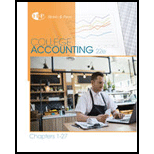
College Accounting, Chapters 1-27
23rd Edition
ISBN: 9781337794756
Author: HEINTZ, James A.
Publisher: Cengage Learning,
expand_more
expand_more
format_list_bulleted
Concept explainers
Question
Chapter 16, Problem 2CP
To determine
Prepare the
Expert Solution & Answer
Want to see the full answer?
Check out a sample textbook solution
Students have asked these similar questions
A company's stock price is
$80, with earnings per
share (EPS) of $10 and an
expected growth rate of
12%.
Kazama owns JKL Corporation stock with a basis of $20,000. He exchanges this for $24,000 of STU stock and $8,000 of STU securities as part of a tax-free reorganization. What is Kazama's basis in the STU stock?
Kensington Textiles, Inc. manufactures customized tablecloths. An experienced worker can sew and embroider 10 tablecloths per hour. Due to the repetitive nature of the work, employees take a 10-minute break after every 10 tablecloths. Additionally, before starting each batch of 10 tablecloths, workers spend 8 minutes cleaning and setting up their sewing machines. Calculate the standard quantity of direct labor for one tablecloth.
Chapter 16 Solutions
College Accounting, Chapters 1-27
Ch. 16 - There are two methods of accounting for...Ch. 16 - The matching principle states that debits should...Ch. 16 - Using the percentage of sales method, the balance...Ch. 16 - When an account is written off under the allowance...Ch. 16 - Each time an account is written off under the...Ch. 16 - The dollar difference between Accounts Receivable...Ch. 16 - A business has an ending balance in Accounts...Ch. 16 - A business has an ending balance in Accounts...Ch. 16 - Prob. 4MCCh. 16 - Under the allowance method, when an account is...
Ch. 16 - Prob. 1CECh. 16 - Tonis Tech Shop has total credit sales for the...Ch. 16 - Fionas Pharmacy uses the direct write-off method...Ch. 16 - Prob. 1RQCh. 16 - Prob. 2RQCh. 16 - Prob. 3RQCh. 16 - Prob. 4RQCh. 16 - Prob. 5RQCh. 16 - Prob. 6RQCh. 16 - Prob. 7RQCh. 16 - Under the allowance method, what journal entries...Ch. 16 - Prob. 9RQCh. 16 - Prob. 10RQCh. 16 - CALCULATION OF NET REALIZABLE VALUE L. R. Updike...Ch. 16 - UNCOLLECTIBLE ACCOUNTSPERCENTAGE OF SALES Rossins...Ch. 16 - UNCOLLECTIBLE ACCOUNTSPERCENTAGE OF RECEIVABLES...Ch. 16 - COLLECTION OF ACCOUNTS WRITTEN OFFALLOWANCE METHOD...Ch. 16 - UNCOLLECTIBLE ACCOUNTSPERCENTAGE OF SALES AND...Ch. 16 - DIRECT WRITE-OFF METHOD Maria Rivera, owner of...Ch. 16 - COLLECTION OF ACCOUNT WRITTEN OFFDIRECT WRITE-OFF...Ch. 16 - UNCOLLECTIBLE ACCOUNTSALLOWANCE METHOD Pyle...Ch. 16 - UNCOLLECTIBLE ACCOUNTSPERCENTAGE OF SALES AND...Ch. 16 - AGING ACCOUNTS RECEIVABLE An analysis of the...Ch. 16 - DIRECT WRITE-OFF METHOD Williams Hendricks...Ch. 16 - CALCULATION OF NET REALIZABLE VALUE Mary Martin...Ch. 16 - UNCOLLECTIBLE ACCOUNTS-PERCENTAGE OF SALES Nicoles...Ch. 16 - UNCOLLECTIBLE ACCOUNTS-PERCENTAGE OF RECEIVABLES...Ch. 16 - COLLECTION OF ACCOUNT WRITTEN OFFALLOWANCE METHOD...Ch. 16 - UNCOLLECTIBLE ACCOUNTSPERCENTAGE OF SALES AND...Ch. 16 - DIRECT WRITE-OFF METHOD Brent Mussellman, owner of...Ch. 16 - COLLECTION OF ACCOUNT WRITTEN OFFDIRECT WRITE-OFF...Ch. 16 - UNCOLLECTIBLE ACCOUNTSALLOWANCE METHOD Lewis...Ch. 16 - UNCOLLECTIBLE ACCOUNTSPERCENTAGE OF SALES AND...Ch. 16 - AGING ACCOUNTS RECEIVABLE An analysis of the...Ch. 16 - DIRECT WRITE-OFF METHOD Lee and Chen Distributors...Ch. 16 - Sam and Robert are identical twins. They opened...Ch. 16 - Martel Co. has 320,000 in Accounts Receivable on...Ch. 16 - Prob. 2CPCh. 16 - At the end of 20-3, Martel Co. had 410,000 in...
Knowledge Booster
Learn more about
Need a deep-dive on the concept behind this application? Look no further. Learn more about this topic, accounting and related others by exploring similar questions and additional content below.Similar questions
- Solvearrow_forwardProblem: The bank statement balance of $7,000 does not include a check outstanding of $1,000, a deposit in transit of $275, and another company's $250 check erroneously charged against your firm's account. The reconciled bank balance is__?arrow_forwardGiven step by step explanation general accounting questionarrow_forward
- Do fast answer of this accounting questionsarrow_forwardNick and Partners, a law firm, worked on a total of 1,000 cases this month, 800 of which were completed during the period. The remaining cases were 40% complete. The firm incurred $180,000 in direct labor and overhead costs during the period and had $4,800 in direct labor and overhead costs in beginning inventory. Using the weighted average method, what was the total cost of cases completed during the period?arrow_forwardWhat was the variable overhead ratearrow_forward
arrow_back_ios
SEE MORE QUESTIONS
arrow_forward_ios
Recommended textbooks for you
 College Accounting, Chapters 1-27AccountingISBN:9781337794756Author:HEINTZ, James A.Publisher:Cengage Learning,
College Accounting, Chapters 1-27AccountingISBN:9781337794756Author:HEINTZ, James A.Publisher:Cengage Learning,

College Accounting, Chapters 1-27
Accounting
ISBN:9781337794756
Author:HEINTZ, James A.
Publisher:Cengage Learning,
Accounts Receivable and Accounts Payable; Author: The Finance Storyteller;https://www.youtube.com/watch?v=x_aUWbQa878;License: Standard Youtube License